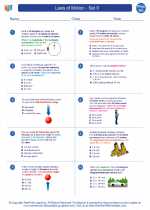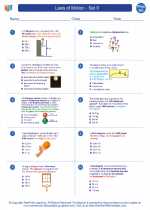Cause in Physics
In physics, the concept of cause refers to the interaction between two objects or systems that results in a change in their state of motion or energy. This interaction is often described by Newton's laws of motion and the principles of energy conservation.
Newton's Laws of Motion
According to Newton's first law of motion, an object at rest will remain at rest, and an object in motion will continue in a straight line at a constant speed, unless acted upon by a net external force. This force is the cause of a change in the object's state of motion.
Newton's second law of motion states that the acceleration of an object is directly proportional to the net force acting on it and inversely proportional to its mass. This law quantitatively describes the cause-and-effect relationship between force and acceleration.
Newton's third law of motion states that for every action, there is an equal and opposite reaction. When one object exerts a force on another, the second object exerts an equal and opposite force on the first. This principle illustrates the cause-and-effect nature of forces in pairs.
Energy Conservation
In the context of energy, cause refers to the transfer or transformation of energy from one object or system to another. The principle of energy conservation states that energy cannot be created or destroyed, only transferred from one form to another. Therefore, any change in the energy of a system must have a specific cause, such as the application of a force or the release of potential energy.
Study Guide
To understand the concept of cause in physics, it is important to grasp the following key points:
- Newton's laws of motion and their application to various physical situations.
- The relationship between force, mass, and acceleration as described by Newton's second law.
- The concept of action and reaction pairs as outlined in Newton's third law.
- The principle of energy conservation and its implications for understanding the causes of changes in energy within a system.
- Practice problems and real-world examples to reinforce the understanding of cause-and-effect relationships in physics.
By mastering these fundamental concepts and principles, students can develop a deep understanding of the role of cause in shaping the behavior of objects and systems in the physical world.
.◂Physics Worksheets and Study Guides High School. Laws of Motion - Set II

 Worksheet/Answer key
Worksheet/Answer key
 Worksheet/Answer key
Worksheet/Answer key
